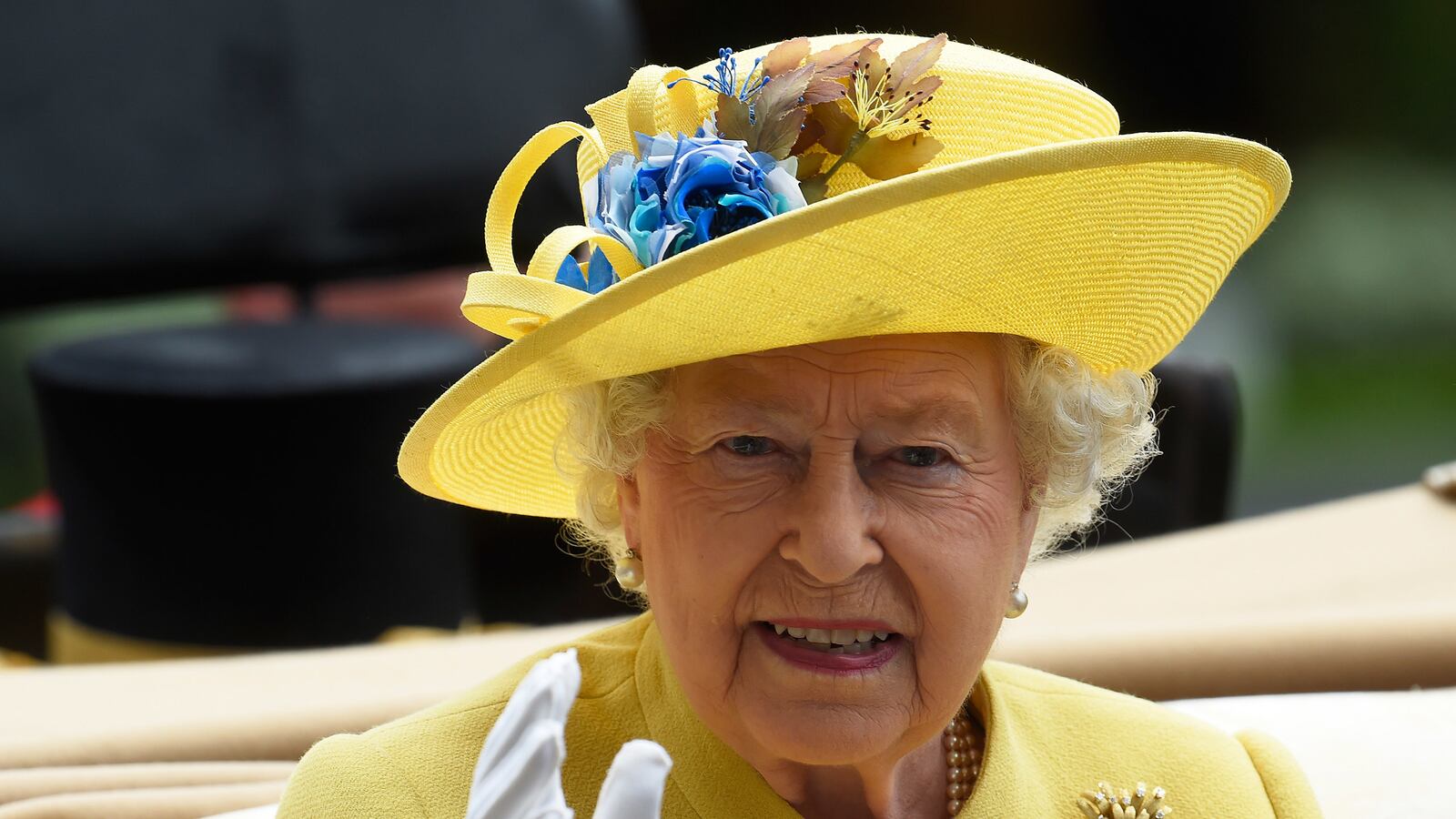History will record that Queen Elizabeth II has been the model of a constitutional monarch—impeccably non-political in public.
But in private it is a different story. Her Majesty can be refreshingly outspoken among friends, as we discovered last month from her comments on the “very rude” Chinese delegation in London—and the same is true when it comes to Europe.
Just last weekend, she spoke up at her birthday celebrations in favor of the “many benefits that can flow when people come together for a common purpose—as family, friends or neighbors.” This was taken by some as a coded endorsement of her government’s “Remain” policy.
But back in March, someone who it has been widely suggested was Michael Gove, her indiscreet Lord Chancellor, revealed that the Queen had spoken up strongly against the EU in a private 2011 discussion with the then Deputy Prime Minister Nick Clegg.
And while Buckingham Palace has rightly deplored the impropriety of disclosing Her Majesty’s private remarks, the Palace has been careful not to define her views, nor to deny that her sympathies might, on occasions, like those of many of her subjects, have veered towards Brexit.
“Give me THREE good reasons,” she has, apparently, been asking her dinner companions recently, “why Britain should be part of Europe?”
Well, Ma’am, may I respectfully try on you this trio—King Canute, King William the Conqueror, and King William III? They were three of your wisest and most successful predecessors, and each of them was a European—a Dane, a Norman, and a Dutchman respectively.
As Her Majesty learned from her history tutor Sir Henry Marten, her Stuart predecessors had problems with those inter-dependent constitutional s-words—“sovereignty” and “sharing”.
The two King Jameses and King Charles I and II had an aversion to compromise and to working within some sort of larger community like Parliament. They could not see how sharing power could contribute to the wider good—and also to their own survival.
In 1649 Charles I famously lost his head for seeking to argue the point, along with the 84,000 or more who died in the Civil War he provoked.
It took the Dutchman William of Orange to modify the Stuarts’ obstinate divine right of kings in 1688 with his pragmatic experience of European democracy. His “Glorious Revolution” was the foundation of the “English” constitutional monarchy that stabilized our political and social progress—alongside the Church of “England”, with its reforming theology provided by a German (Martin Luther) and a Frenchman (John Calvin).
And what was the original family name of the Queen’s beloved “Grandpapa England,” King George V, before he nimbly invented the House of Windsor in 1917? He was a Saxe-Coburg-Gotha, the name of the British royal family for seventy-seven years following the marriage of Queen Victoria to Prince Albert.
And how about our present-day prince consort, Philip Mountbatten—born a Danish prince of Greece? More than three million British schoolchildren have benefitted from the outdoor expeditions and challenges of the Duke of Edinburgh’s Award Scheme, inspired by ‘Phil the Greek’ (along with his German Jewish mentor, Kurt Hahn).
Our “British” monarchy is a mongrel miracle built of European components—and a testament, through all its ups and downs, to the virtues of sharing sovereignty and of working together towards the complexities of a common compromise.
In this it is matched by the successive waves of foreigners who have mingled to create our imagined “island race” that is actually inseparable from Europe—as we discovered recently from a segment on HM’s favorite wireless fare, BBC Radio 4’s Today program, which glorified the great “British” victory over the French at the battle of Waterloo.
In fact, of course, it was the arrival of the Prussian army under General Blücher which won the day that the Duke of Wellington might otherwise have lost—and the forces that Wellington commanded were not uniquely British. They were a pan-European coalition embracing Russia, the Netherlands, Sweden, Austria, Spain, Portugal, Sardinia and a number of German states. How right Blücher was to propose “La Belle Alliance” as the ideal name for the battle, particularly as King George III, Britain’s king at the time, was also King of Hanover, the second largest state at that time in northern Germany.
We know from another leaked royal conversation that the European Court of Human Rights has annoyed the Queen as much as many Britons. She felt that the Court’s shielding of Abu Hamza, the extremist Muslim cleric whom the Home Office wished to deport in 2012, “denigrated” Britain.
But the European Convention on Human Rights predates and operates quite separately from the EU. It is actually a British-inspired institution, first proposed by Winston Churchill in 1948 to impose some standards of behavior on post-war Europe.
The Convention was largely drafted by Elizabeth II’s first Home Secretary, David Maxwell Fyfe, later Lord Kilmuir, whose precise and severe legal mind Her Majesty will recall from her Conservative governments of the 1950s. The ECHR predates and operates quite separately from the European Union, and will continue to exercise jurisdiction over us even if we choose Brexit.
It is hardly British for us to walk away from something we created when its decisions go against us, and it is quite dishonest for Brexiteers like Boris Johnson to blame the ECHR for terrorism—as if every European country were not united in seeking to eliminate that terrible scourge.
Britain still has the Queen’s face on our stamps and our bank notes. We are outside both the Euro and the Schengen Agreements.
London has made itself the Hong Kong of a modern Belle Alliance, thanks to the free flow of European money, which is the essence of the capital’s current boom-time prosperity. We island mongrels seem to have negotiated a pretty flexible deal for ourselves inside “monolithic” Europe—and we’re still free to leave at any time in the future we might choose. If we vote to leave now, however, we will never get back in again on such advantageous terms.
If we become another Norway, for example, operating outside but seeking to keep trading with the EU, we shall still have to accept the free movement of labor that so worries the Brexiteers. We shall also have to accept all the red tape and regulation attendant on EU trade—but without any voice in reforming it.
It’s not surprising that Elizabeth II’s views on Europe should be shaped by her fondness for the Commonwealth that she did so much to create. But the big beasts of the Commonwealth like Australia, Canada and India all now operate their world-wide commerce from the basis of localized trade pacts—and as of 2016 Britain’s own local EU pact has set up or is busily negotiating Free Trade Agreements with 90% of the fifty Commonwealth countries outside the EU (Malta and Cyprus are both inside). Britain’s exports to the Commonwealth increased last year by no less than ten per cent.
Then there’s that other great achievement of the present reign, the resolution of the war with the IRA and the reconciliation with Ireland to which the Queen has personally contributed so much.
In 1998 the Good Friday Agreement relied heavily on the practicalities of co-existence made possible by free movement between northern and southern Ireland.
Leaving the EU could restore the old divisive barriers along the twenty or more crossing points of the “hard” Irish border—a body blow to the still fragile peace process in Ulster. And with the Scottish government and people resolute to remain inside the EU that brings them so many benefits, an English vote to leave could spell disaster. Brexit could mean Break-Up for the United Kingdom as we know it.
As a constitutional monarch, the Queen will not have a vote on June 23rd. And for those of us who believe we should be seeking to strengthen the European moorings of our miraculously semi-detached realm, I am only guessing that may be just as well.
Robert Lacey is the author of Majesty: Elizabeth II and the House of Windsor and The Queen—A Life in Brief.






